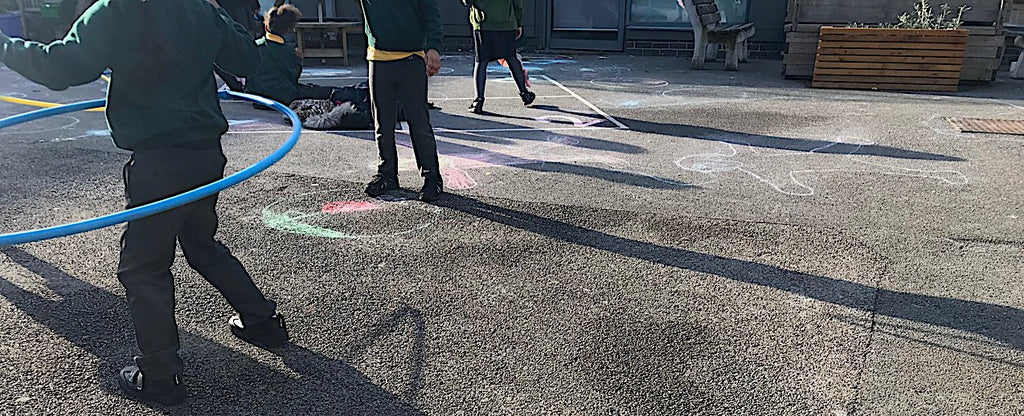This post was written for the London National Park City. Do check them out!
As London’s Primary Heads wrestle with the whether, when and how of reopening their schools, they may need to drastically rethink the school day and the learning environment.
The current, and urgent, debate around school opening leads me to propose two key questions for London schools:
- What if we adopted a Scandinavian approach, with more time outdoors?
- What if every school made using outdoor space a substantial part of every day?
What would be needed to make this happen? Could such an approach lead to happier, healthier, more resilient children who are ready to learn and more inspired to look after the planet? (Hint, that’s what the research suggests…)
These questions are already part of the policy debate.
The DfE Planning Guide for Primary Schools[1] and the supplementary guidance ‘Implementing protective measures in education and childcare settings’[2] both invite schools to consider how they can use outside space for exercise, breaks and outdoor education where possible, as this can limit transmission and more easily allow for distance between children and staff.
There has been such a flurry of guidance and commentary these short statements seem to have been largely overlooked, but the official endorsement is there:
Taking classes outdoors is not only possible, it is recommended by the DfE.
So, on to the necessary considerations…
Do London Schools have the space?Most London schools have playgrounds, and many have school gardens or playing fields nearby, which they can use. Some do not, but they may have regular access to nearby parks and streets. Unlike in other countries (India and the USA mostly[3]) it is a very rare school that has no playtime or access to outdoors[4].
If space is limited, with local authority support, schools could look to close the streets around them[5], to create extra square metres for play, and make parents’ drop off and pick up (on foot of course!) easier and safer. As the GLA is already rethinking urban space to prioritise pedestrians and cyclists, Heads may find it much easier to facilitate this now, compared to pre-lockdown.
As we enter late June and July schools may need to rig up sun shelters, and schools will definitely need to invest in sets of clothes for children and staff, to protect them from summer sun or English rain. Nonetheless, taking all lessons outdoors is physically possible.
Do London Schools have the skills to take lessons outdoors and make playtimes more playful?
Planning to move teaching outdoors and to extend playtimes involves the same sort of careful transition as say, introducing team teaching (or indeed remote learning). It may be a bit of a learning curve – and require sun lotion or extra warm hats – but it can also be one of the most rewarding changes teachers can make.
The Outdoor Classroom Day campaign has guidance written by experts in outdoor learning[6] and in creating playful environments[7] that can help start schools’ journeys, as well as providing connections to thousands of other schools on the same path. This guidance is available in multiple languages too – useful in multi-lingual London! The campaign was founded here in London and you can find all the other London schools involved just by looking at the map.
A number of organisations, such as Learning through Landscapes, EcoSchools and The Garden Classroom, offer training packages giving teachers the basic skills they need. Support is also available from Groundwork, Council for Learning Outside the Classroom (CLOtC), Trees for Cities, the Scrapstores, OPAL CiC and others – all of whom can help in planning to make the best use of the outdoors in line with current guidance.
Over the last few years, many London schools have developed remarkable forest schools, garden learning, chicken coops, bee-hives and Eco-groups. In addition, London already has several award-winning all-outdoor nurseries such as Free Range Urban Kids in Hackney. In September last year the first all outdoor primary school was opened – Liberty Woodland School in Wimbledon.
Those starting out on this journey will find help is just a tweet away.
What difference would it make?
As we weigh up the risk and benefit of re-opening schools, it is vital we balance the risk of potential transmission against the benefit of socialisation and a return to learning and community.
Every teacher knows children spread illness. However, the evidence is emerging to suggest children may be less at risk of catching coronavirus and less likely spread it.[8] With outdoor learning as a default, the risk of transmission could be reduced, as children and teachers can more easily social distance outside. David Sobel (2004), in one seminal study noted how students in an ‘Outdoors in All Weather’ programme reported suffering 80% fewer infectious diseases (colds, sore throats etc.) than children in conventional programmes[9]. This is echoed in almost every evaluation of outdoor learning undertaken – and comes through loudly on Outdoor Classroom Day every year.
Juliet Robertson, author of Messy Maths and Dirty Teaching says one immediate benefit of opening schools would be to counter the effect lockdown is having on children’s mental health: ‘Being outside, especially in greenspace is known to reduce stress levels in children and adults. Cortisol levels drop. Furthermore, as studies indicate, transmission rates of COVID-19 are significantly lower outside, so if children are unable to keep their social distance, it may not be of such significance as indoors.’
Lizzy Hassay, Co-Founder of Free Range Urban Kids, says: 'you can do the curriculum easier in an outdoor environment than in an indoor setting. Once you have realised that you have overcome the largest challenge.'
More play, more resilience
The biggest difference for children right now could simply be being able to play with other children and to re-connect to the world around them.
While everyone is focusing on the lessons children are missing, it’s their socialisation and mental health needs that are of greatest concern to children’s health professionals across the country. In a recent news article Sam Cartwright-Hatton, Professor of Clinical Child Psychology at the University of Sussex, said: ‘All the research indicates that children’s emotional health is suffering in the lockdown and it seems likely that this suffering will, in many cases, continue into the long term.’[10]
Families I work with through Outdoor People have told us their normally cheerful children are crying for no reason; and that younger children are regressing a little, demanding to sleep in the same bed as their parents. Online playdates are fun up to a point, but even parents and older siblings have had enough of Zoom. As stress levels increase, homeschooling has got harder.
Dr Jenny Gibson, Senior Lecturer in Psychology and Education at the University of Cambridge recently said: ‘It’s easy to dismiss play as unimportant, but for children, playing with friends and classmates has a very significant impact on their social development.
‘Critically, it is an important way of working through emotions ... for that reason it’s important that whatever steps are taken to ease social distancing restrictions, children are given time and space to play with friends.’[11]
Children may well be playing differently in the next few weeks and months, as they have had to cope with new experiences, possibly traumatic ones. It is essential that they have the time, space and opportunity to work through these experiences.
As the play theorist Brian Sutton Smith said, play makes the world less boring and less scary[12]. The International Play Association Play in Crisis resources for parents [13] summarise this:
Can we capitalise on the learning that happened in lockdown?
Over the last few weeks it seems everyone in London has suddenly realised the importance of the natural world in their lives, in a way that may have been unthinkable only a few months ago.
One of the children that started coming on Outdoor People’s Wild Walks five years ago, has spent the last eight weeks becoming an expert on newts, and now the lockdown has been eased he and his mum are exploring parks and rivers across London finding more of them. It’s an experience that may shape his life forever.
To build up a deep connection to nature, so that you care about it and want to protect it, requires just two things: regular everyday access to an outdoor space nearby that you can visit and spend time in, and a knowledgeable supportive mentor to help you develop your regard for nature[14].
For some children this last eight weeks will have furnished that. For others, perhaps it could be the next eight weeks?
What if we changed the way children learn for good?
Over the next few weeks, school leaders and educators will need to reflect, respond and adapt. One thing is certain, however: the shape of the school day is guaranteed to look very different from January this year.
So… What If London schools made full use of their outdoor spaces as they re-open, whether in June or later in the year?
Lizzy Hassay, CoFounder of Free Range Urban Kids, an all outdoor nursery says: 'Outside space allows for social distancing to happen more naturally. The weather is on our side, so the children are able to play freely. We have no toys and use natural resources so it is easier to manage and control infection risks better outdoors.
'Children enjoy the simpler things, like playing with mud and water – they can make mud pies or jump in muddy puddles. There are so many things to explore in nature from encountering ladybirds, centipedes and worms, to building dens or just feeling the sun and the wind on your skin.
'Being in nature and outdoors is good for the soul, spirit and immune system.'
So… What If London schools really did make the outdoors their classroom year round?
Maybe today’s Year Sixes will at least be able to spot a newt and understand the lifecycle of an apple tree. Teachers and pupils would be calmer and happier. Children may be able to more quickly adapt and re-connect to their safe place of learning. And your school may have time to develop the skills to sustain outdoor learning and to create great play spaces that will be of benefit to your school community – and your teachers – for many years to come.
Thursday, 21 May, would have been Outdoor Classroom Day… we are inviting everyone – families, schools, anyone that thinks children should be outdoors - to dress up and celebrate #PlayfulNature and join our community.
Find out more here: https://outdoorclassroomday.org.uk/
Join the London National Park City Schools Network here: http://www.nationalparkcity.london/schools-network
Cath is an ex-teacher and a campaigner for children’s rights to be outdoors. Six years ago she set up this social enterprise, Outdoor People, supporting children and families to get outdoors every day, and has been the Global Partnerships Director, for Outdoor Classroom Day (hosted by Semble) for the last five years. Last year she convened the London National Park City Schools Network, which is bringing together all of us that care about connecting schools to all the amazing outdoor space London has to offer.
[1] https://www.gov.uk/government/publications/preparing-for-the-wider-opening-of-schools-from-1-june/planning-guide-for-primary-schools
[2] https://www.gov.uk/government/publications/coronavirus-covid-19-implementing-protective-measures-in-education-and-childcare-settings/coronavirus-covid-19-implementing-protective-measures-in-education-and-childcare-settings#class-or-group-sizes
[3] https://outdoorclassroomday.org.uk/resource/muddy-hands-report/
[4] ibid
[5] http://schoolstreets.org.uk/where/
[6] https://outdoorclassroomday.org.uk/resource/getting-going-outdoor-learning/
[7] https://outdoorclassroomday.org.uk/resource/making-playtime-key-part-school-day/
[8] https://rethinkingchildhood.com/2020/05/14/covid-19-children-science-lockdown-schools-childcare-outdoor-play/
[9] https://outdoorclassroomday.org.uk/resource/muddy-hands-report/
[10] https://www.theguardian.com/education/2020/may/07/prioritise-play-when-schools-reopen-say-mental-health-experts-coronavirus-lockdown
[11] ibid
[12] https://www.thedeveloper.live/places/stop-the-traffic-and-make-uk-streets-into-public-spaces-during-lockdown?fbclid=IwAR365yK1R08utVd7ZFqBfex5g1mv9Dx4tN9uBqeAT4547BJjaoyGhOHisoA
[13] http://ipaworld.org/resources/for-parents-and-carers-play-in-crisis/


